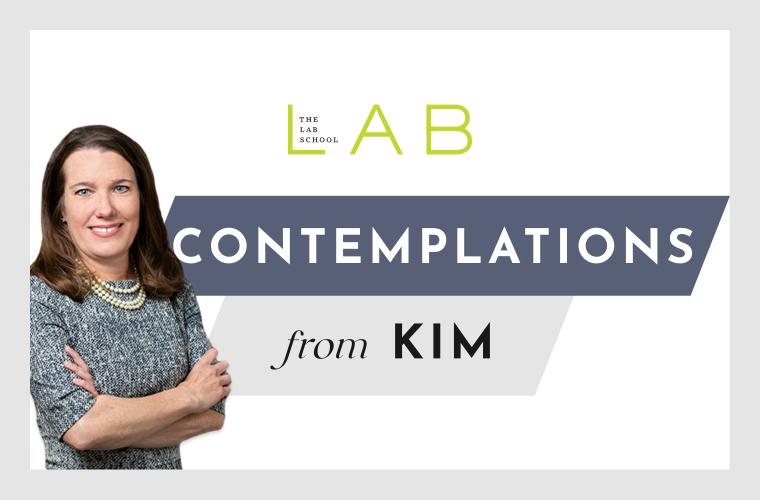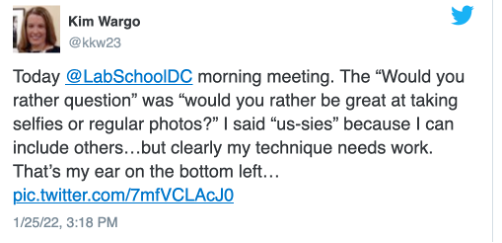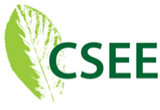Contemplations from Kim: Six Commitments for our Community
By Kim Wargo

When we returned from the Winter Break, it was to a newly complicated world! Omicron was surging, AND we are recognizing that the pandemic of early 2022 is not the same pandemic of early 2021.
Even as we have reinstituted some of our risk mitigation protocols to get us through this current wave of new infections, we are also considering how to move our mindsets and our practices from pandemic to endemic thinking. This will, we know, require adjustments for all of us, and will require us to continue practicing “community thinking,” since we know there will be a myriad of viewpoints and perspectives across our families, faculty, and staff.
In my presentations to our faculty/staff, to our parents, and to our board in the month of January, I have shared 6 “commitments” that I think are helpful as we navigate this yet-again new landscape. I hope that these ideas can help us all in the complicated roles we play as we partner to provide the best possible educational and social-emotional environment for the children and adolescents in our care.
Be kind to yourself and to each other.
I truly believe that there has never been a harder time to be a parent or an educator. At this point, we have been managing 22 months of disruption to our lives as we knew them. For our youngest students, this represents almost a quarter of their lives. Some of them may not have good memories of a pre-COVID time. As adults, we have very good memories of what was before – and we yearn to get back to that.
In these moments of trying to support our children, we also have to remember to take care of ourselves. This is why I think kindness is such an important value for us to prioritize.
Leo Buscaglia, author and noted Professor in the Department of Special Education at USC, long ago reminded us of this: “Too often we underestimate the power of a touch, a smile, a kind word, a listening ear, an honest compliment, or the smallest act of caring, all of which have the potential to turn a life around.”
I hope that in this time, we can continue to practice kindness to each other and to ourselves.
Ask for help when you need it.
This is a really important one! We need to model this for our children and adolescents. It is ok to reach out and ask for help when you are struggling.
This applies to all in our community.
For our teachers, this might mean letting their division head know when they need additional resources, particularly the most precious resource of time! It might mean asking for support from one of our social workers in helping students navigate a conflict. It might mean sharing with me a personal or family challenge that is adding stress and worry to their daily lives.
For parents, this may mean reaching out to a division head to express a concern about something you are seeing or hearing from your child. We so appreciate when parents do this, because we can’t address an issue until we know about it. Often there are complexities to a situation that aren’t immediately clear, and I have found that there is nothing better for complexity than conversation.
It might mean letting me know about your frustration about a “snow day” that wasn’t! And trust me, I share your frustration, and I’m grateful that several parents reached out to have this conversation. When our public school districts cancel school, this impacts our ability to have a productive day of teaching and learning because many of our team have children in public schools across the DMV. We will continue to strive to do everything in our power to keep our students in person with us at school.
If we model asking for help when we’re struggling, we will show our children that it’s ok to do that too.
Good enough is good enough.
This is an especially tough one for teachers and parents. We tend to hold ourselves to impossible standards on the things we care most about – and we all care most about being great at working with and supporting our children.
This is another area where it’s important to model to kids that not everything on our “to do” list has to be completed with 100% of our effort. Some of those things may need to be crossed off our “to do” list. Maybe they’re “nice to have” but not necessary. Sometimes it’s ok just to get something “done,” without feeling like it has to be perfect.
Perfect is not a standard we can, or should, strive to achieve. Even for those things that are most important, and truly do deserve our best effort, we need to be ok with striving for excellence, and recognizing that excellence and perfection are not one and the same.
I had a great reminder about “good enough” being “good enough” this week. I was at Foxhall visiting a morning meeting, and was participating in the “Would you rather?” activity.
I had what I like to describe as a “splendid failure” in trying to Tweet about my morning (see below for a clear illustration!)
Instead of discarding the photo, I decided to embrace it and tell the world about it! In this instance, good enough WAS good enough because the point of my presence was just that – my presence.


Kids thrive where there is consistency and care.
This. This is the key.
If you follow “teacher Twitter”, you will note lots of talk about the gap that some students are showing in skills like conflict resolution.
Some young people are presenting as “younger” than their actual age in terms of social-emotional development. This is not surprising when you consider that as a society we have spent quite a lot of time in the last 22 months not engaging with each other in usual ways.
I’m sure even adults feel that our social skills have atrophied a bit.
(I’m finding it hard to imagine how comfortable I was pre-pandemic with navigating a large cocktail party where I had to circulate and talk to crowds of people in small, individual conversations!).
We know kids are struggling. And yet, we also know that kids thrive where there is consistency and care.
We can normalize for our kids that some of the things they are experiencing are a typical part of growing up and learning how to navigate the world – and that it’s not surprising (and perfectly ok!) that they need more practice with these skills.
This doesn’t mean that we don’t hold kids accountable for behaviors that are unacceptable in our community. It does mean, however, that we approach those accountability conversations with a measure of grace and understanding for what might actually be at the root of behavior.
I’ve continued to use the Ted Lasso-ism I shared earlier this year as my mantra: “Be curious, not judgmental.” I can’t tell you how much this simple mindset has helped me this year.

If we just keep working together to help our children close the gaps – both social-emotional and academic – we will get there, because…
We can do hard things…together.
We can. We truly can. We have done hard things since March 2020 – no doubt! But, at Lab, our kids do hard things every day.
Overcoming the challenges that come with having language-based learning differences isn’t easy. If you’re dyslexic, becoming a fluent reader is hard work. Pure and simple. There is no other way to say it.
And yet, our kids are doing this each and every day. They are finding a way. And that’s because we are doing this together.
“No one belongs here more than you.”
Lastly, I hope that we can stay singularly focused on this goal: the goal that every member of this community truly believes it when we look them in the eye and say “No one belongs here more than you.”
There is nothing that makes a person feel confident enough to take risks than feeling that you truly belong.
We know that fostering belonging for every person is complex. We know we still have much work to do. But this is the work that is worth doing.
Because belonging is, at the end of the day, the key to building a sustainable, inspiring, and affirming community like Lab.
Click the button below to listen to an audio recording of this month's column.


